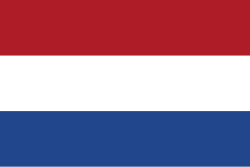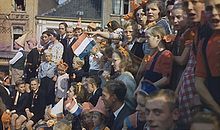Timeline of Eindhoven
Appearance
The following is a timeline of the history of the municipality of Eindhoven, Netherlands.
Prior to 20th century
[edit]| History of the Netherlands |
|---|
 |
|
|
- 1232 - Town rights bestowed by Henry I, Duke of Brabant.[1]
- 1420 - Castle built.
- 1486 - 19 March: 1486 Eindhoven fire.
- 1554 - Fire.
- 1583 - Siege of Eindhoven (1583).
- 1629 - Eindhoven becomes part of the Netherlands.
- 1771 - Jewish cemetery, Eindhoven established.
- 1791 - Population: 1,785.[2]
- 1815 - Population: 2,310.[2]
- 1846 - Eindhoven Canal dug.[3]
- 1866
- Eindhoven railway station opens.
- Synagogue built.[4]
- 1867 - Saint Catherine Church, Eindhoven rebuilt.
- 1869 - Town Hall built.
- 1880 - St. Peter's Church, Eindhoven built.
- 1891 - Philips in business.[1]
- 1897 - Eindhoven-Reusel tram line begins operating.[5]
- 1898 - St. Augustine's Church, Eindhoven built.
- 1900 - Population: 4,730.[6]
20th century
[edit]- 1904 - Wilhelminaplein (Eindhoven) (square) laid out.[citation needed]
- 1909
- FC Eindhoven (football club) formed.
- Kantoorgebouw Coöperatieve Centrale Boerenleenbank built on Dommelstraat.
- 1910 - Philips Stadion (stadium) opens.
- 1911 - Eindhovens Dagblad (newspaper) begins publication.[7]
- 1913 - PSV Eindhoven (football club) formed.
- 1920
- 1921 - Lichttoren (Eindhoven) built.
- 1929 - PSV Eindhoven wins its first Dutch football championship.
- 1931 - Witte Dame built.
- 1932
- Welschap Airfield begins operating.
- DAF Trucks in business.[1]
- 1935 - Population: 103,030.[2]
- 1936 - Van Abbemuseum opens.
- 1937 - Museum Kempenland opens.

Liberation of Eindhoven, 20 September 1944 - 1939 - Witte Dorp neighborhood developed.[8]
- 1942 - December: Aerial bombing by Allied forces.[9]
- 1943 - September: Subcamp of the Herzogenbusch concentration camp established by the German occupiers.[10]
- 1944
- 1945 - Het Vrije Volk newspaper begins publication.[7]
- 1947 - Design Academy Eindhoven established.
- 1954 - FC Eindhoven wins its first Dutch football championship.
- 1955 - Population: 154,604.[2]
- 1956
- Eindhoven railway station rebuilt.[12]
- Eindhoven University of Technology established.[13]
- 1959
- Eindhoven Marathon begins.
- Herman Witte becomes mayor.
- 1964
- Parktheater Eindhoven opens.
- Philips Nederland built.
- 1966 - The futuristic Evoluon science museum was built.
- 1967 - City Hall rebuilt.[citation needed]
- 1969 - Student centre De Bunker (Eindhoven) built.
- 1970 - De Bijenkorf department store built.[12]
- 1971 - Effenaar youth centre established.
- 1976 - Administrative entity for the Eindhoven agglomeration created.[14]
- 1979 - Gilles Borrie becomes mayor.
- 1980 - Het Apollohuis cultural venue established.
- 1982 - Open-air Eindhoven Museum and Streekarchief regio Eindhoven (regional archive)[15] established.
- 1984 - Eindhoven Airport terminal built.
- 1985 - May: Catholic pope visits city.
- 1992
- Muziekgebouw Frits Philips (concert hall) opens.
- Rein Welschen becomes mayor.
- 1993 - Holland Casino branch in business.
- 1996 - 15 July: 1996 Belgian Air Force Hercules accident occurs at Eindhoven Airport.
- 1997
- Philips headquarters relocated to Amsterdam.[16]
- Jan Louwers Stadion (stadium) in use.
- 1999 - De Regent hi-rise built.
- 2000
- UEFA Euro 2000 football contest held.
- Population: 203,433.[2]
21st century
[edit]- 2001 - City joins regional BrabantStad group.[1]
- 2002
- Leefbaar Eindhoven political party active.
- Dutch Design Week begins.[16]
- Avant-Garde van Groeninge restaurant in business.
- 2003
- Regionaal Historisch Centrum Eindhoven active.[15]
- Kennedytoren hi-rise built.
- 2004 - Inkijkmuseum opens.
- 2006
- Glow Festival Eindhoven begins.
- De Admirant, Porthos, and Vesteda Toren hi-rises built.
- 2008
- De Parade (Eindhoven) built.
- Rob van Gijzel becomes mayor.
- Automotive Pole Position Eindhoven event held.
- 2009 - Strijp R redevelopment begins (approximate date).
- 2010
- Admirant shopping centre's "Blob" building constructed.[17]
- Piet Hein Eek studio in business.[16]
- 2012 - Stadionkwartier (Eindhoven) built.
- 2014 - 19 March: Dutch municipal elections, 2014 held.
- 2015 - Population: 223,220 city; 753,426 metro region.
See also
[edit]- Eindhoven history
- History of Eindhoven
- List of mayors of Eindhoven
- List of rijksmonuments in Eindhoven
- Timelines of other municipalities in the Netherlands: Amsterdam, Breda, Delft, Groningen, Haarlem, The Hague, 's-Hertogenbosch, Leiden, Maastricht, Nijmegen, Rotterdam, Utrecht
References
[edit]- ^ a b c Joop W. Koopmans; Arend H. Huussen Jr. (2007). Historical Dictionary of the Netherlands (2nd ed.). Scarecrow Press. ISBN 978-0-8108-6444-3.
- ^ a b c d e f "Historie: Groei van Eindhoven (inwoners)". Eindhoven (in Dutch). Gemeente Eindhoven. Retrieved 30 October 2015.
- ^ Abraham Jacob van der Aa (1851). "Eindhoven". Aardrijkskundig woordenboek der Nederlanden [Geographical dictionary of the Netherlands] (in Dutch). Vol. 13. Gorinchem: Jacobus Noorduyn. hdl:2027/uc1.$b519552 – via HathiTrust.
- ^ "Eindhoven". Four Hundred Years of Dutch Jewry. Amsterdam: Joods Historisch Museum. Retrieved 30 October 2015.
- ^ W. J. M. Leideritz (1978). De tramwegen van Noord-Brabant (in Dutch). Brill. ISBN 90-04-05706-4.
- ^ Chisholm, Hugh, ed. (1911). . Encyclopædia Britannica. Vol. 9 (11th ed.). Cambridge University Press. p. 134.
- ^ a b Jan van de Plasse (2005). Kroniek van de Nederlandse dagblad- en opiniepers (in Dutch). Otto Cramwinckel. ISBN 978-90-75727-77-7. (timeline)
- ^ "Historie van het Witte Dorp". Stichting Witte Dorp de Burgh (in Dutch). Retrieved 30 October 2015.
- ^ Richard Overy (2013). The Bombers and the Bombed: Allied Air War Over Europe 1940-1945. Penguin. ISBN 978-0-698-15138-3.
- ^ a b Megargee, Geoffrey P. (2009). The United States Holocaust Memorial Museum Encyclopedia of Camps and Ghettos 1933–1945. Volume I. Indiana University Press, United States Holocaust Memorial Museum. p. 820. ISBN 978-0-253-35328-3.
- ^ Leon E. Seltzer, ed. (1952), Columbia Lippincott Gazetteer of the World, New York: Columbia University Press, p. 562, OL 6112221M
- ^ a b Hans van Dijk (1999). Twentieth-century Architecture in the Netherlands. Rotterdam: 010 Publishers. ISBN 978-90-6450-347-4.
- ^ Walter Rüegg [in German], ed. (2011). "Universities founded in Europe between 1945 and 1995". Universities Since 1945. History of the University in Europe. Vol. 4. Cambridge University Press. ISBN 978-1-139-49425-0.
- ^ Major Cities and Their Peripheries: Cooperation and Coordinated Management. Local and Regional Authorities in Europe. Council of Europe Press. 1993. ISBN 978-92-871-2394-7.
- ^ a b Introductie RHCe: Wat is het RHCe? (in Dutch), Regionaal Historisch Centrum Eindhoven, archived from the original on 7 April 2004
- ^ a b c "A Dutch Factory Town, Now a Design Center", New York Times, 29 July 2011
- ^ "10 of the world's 'blobbiest' buildings", CNN, USA, October 2013
This article incorporates information from the Dutch Wikipedia.
Bibliography
[edit]- in Dutch
- F. N. Smits, Beknopte geschiedenis van Eindhoven (in Dutch) 1887-1888
- L. G. A. Houben (1890), Geschiedenis van Eindhoven (in Dutch)
- Henri Zondervan [in Dutch], ed. (1917), "Eindhoven", Winkler Prins' Geillustreerde Encyclopaedie (in Dutch), vol. 6 (4th ed.), Amsterdam: Uitgevers-Maatschappy „Elsevier“, hdl:2027/mdp.39015068310138
- G. van Herwijnen, ed. (1978). "Noord-Brabant: Eindhoven". Bibliografie van de stedengeschiedenis van Nederland [Bibliography of Urban History in the Netherlands] (in Dutch). Brill. p. 284. ISBN 90-04-05700-5.
External links
[edit]Wikimedia Commons has media related to History of Eindhoven.
- Europeana. Items related to Eindhoven, various dates.
- Digital Public Library of America. Items related to Eindhoven, various dates

